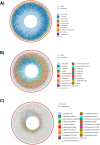Gut microbiome in endometriosis: a cohort study on 1000 individuals
- PMID: 39020289
- PMCID: PMC11256574
- DOI: 10.1186/s12916-024-03503-y
Gut microbiome in endometriosis: a cohort study on 1000 individuals
Erratum in
-
Correction: Gut microbiome in endometriosis: a cohort study on 1000 individuals.BMC Med. 2024 Oct 10;22(1):448. doi: 10.1186/s12916-024-03692-6. BMC Med. 2024. PMID: 39390603 Free PMC article. No abstract available.
Abstract
Background: Endometriosis, defined as the presence of endometrial-like tissue outside of the uterus, is one of the most prevalent gynecological disorders. Although different theories have been proposed, its pathogenesis is not clear. Novel studies indicate that the gut microbiome may be involved in the etiology of endometriosis; nevertheless, the connection between microbes, their dysbiosis, and the development of endometriosis is understudied. This case-control study analyzed the gut microbiome in women with and without endometriosis to identify microbial targets involved in the disease.
Methods: A subsample of 1000 women from the Estonian Microbiome cohort, including 136 women with endometriosis and 864 control women, was analyzed. Microbial composition was determined by shotgun metagenomics and microbial functional pathways were annotated using the Kyoto Encyclopedia of Genes and Genomes (KEGG) database. Partitioning Around Medoids (PAM) algorithm was performed to cluster the microbial profile of the Estonian population. The alpha- and beta-diversity and differential abundance analyses were performed to assess the gut microbiome (species and KEGG orthologies (KO)) in both groups. Metagenomic reads were mapped to estrobolome-related enzymes' sequences to study potential microbiome-estrogen metabolism axis alterations in endometriosis.
Results: Diversity analyses did not detect significant differences between women with and without endometriosis (alpha-diversity: all p-values > 0.05; beta-diversity: PERMANOVA, both R 2 < 0.0007, p-values > 0.05). No differential species or pathways were detected after multiple testing adjustment (all FDR p-values > 0.05). Sensitivity analysis excluding women at menopause (> 50 years) confirmed our results. Estrobolome-associated enzymes' sequence reads were not significantly different between groups (all FDR p-values > 0.05).
Conclusions: Our findings do not provide enough evidence to support the existence of a gut microbiome-dependent mechanism directly implicated in the pathogenesis of endometriosis. To the best of our knowledge, this is the largest metagenome study on endometriosis conducted to date.
Keywords: Endometriosis; Estrobolome; Gut microbiota; Metagenomics; Microbiome; Microbiota; Shotgun sequencing.
© 2024. The Author(s).
Conflict of interest statement
The authors report there are no competing interests to declare.
Figures




Similar articles
-
The role of gut and genital microbiota and the estrobolome in endometriosis, infertility and chronic pelvic pain.Hum Reprod Update. 2021 Dec 21;28(1):92-131. doi: 10.1093/humupd/dmab035. Hum Reprod Update. 2021. PMID: 34718567 Review.
-
Gut Microbiome-Estrobolome Profile in Reproductive-Age Women with Endometriosis.Int J Mol Sci. 2023 Nov 14;24(22):16301. doi: 10.3390/ijms242216301. Int J Mol Sci. 2023. PMID: 38003489 Free PMC article.
-
Gut microbial determinants of clinically important improvement in patients with rheumatoid arthritis.Genome Med. 2021 Sep 14;13(1):149. doi: 10.1186/s13073-021-00957-0. Genome Med. 2021. PMID: 34517888 Free PMC article.
-
Characteristics of Gut Microbiota in Patients with GH-Secreting Pituitary Adenoma.Microbiol Spectr. 2022 Feb 23;10(1):e0042521. doi: 10.1128/spectrum.00425-21. Epub 2022 Jan 12. Microbiol Spectr. 2022. PMID: 35019688 Free PMC article.
-
The Multifactorial Pathogenesis of Endometriosis: A Narrative Review Integrating Hormonal, Immune, and Microbiome Aspects.Medicina (Kaunas). 2025 Apr 27;61(5):811. doi: 10.3390/medicina61050811. Medicina (Kaunas). 2025. PMID: 40428769 Free PMC article. Review.
Cited by
-
Correction: Gut microbiome in endometriosis: a cohort study on 1000 individuals.BMC Med. 2024 Oct 10;22(1):448. doi: 10.1186/s12916-024-03692-6. BMC Med. 2024. PMID: 39390603 Free PMC article. No abstract available.
-
Endometriosis: Future Biological Perspectives for Diagnosis and Treatment.Int J Mol Sci. 2024 Nov 14;25(22):12242. doi: 10.3390/ijms252212242. Int J Mol Sci. 2024. PMID: 39596309 Free PMC article. Review.
-
Effects of gut microbiota in breast cancer.Front Oncol. 2025 Jun 17;15:1617410. doi: 10.3389/fonc.2025.1617410. eCollection 2025. Front Oncol. 2025. PMID: 40599853 Free PMC article. Review.
-
Impact of gut microbiota on endometriosis: linking physical injury to mental health.Front Cell Infect Microbiol. 2025 Jul 7;15:1526063. doi: 10.3389/fcimb.2025.1526063. eCollection 2025. Front Cell Infect Microbiol. 2025. PMID: 40692689 Free PMC article. Review.
-
Unraveling the Contribution of Estrobolome Alterations to Endometriosis Pathogenesis.Curr Issues Mol Biol. 2025 Jul 1;47(7):502. doi: 10.3390/cimb47070502. Curr Issues Mol Biol. 2025. PMID: 40728971 Free PMC article. Review.
References
-
- Taylor HS, Kotlyar AM, Flores VA. Endometriosis is a chronic systemic disease: clinical challenges and novel innovations. Lancet (London, England). 2021;397:839–52. - PubMed
-
- Vercellini P, Viganò P, Somigliana E, Fedele L. Endometriosis: pathogenesis and treatment. Nat Rev Endocrinol. 2014;10:261–75. - PubMed
-
- Chapron C, Marcellin L, Borghese B, Santulli P. Rethinking mechanisms, diagnosis and management of endometriosis. Nat Rev Endocrinol. 2019;15:666–82. - PubMed
Publication types
MeSH terms
LinkOut - more resources
Full Text Sources
Medical
Research Materials
Miscellaneous

